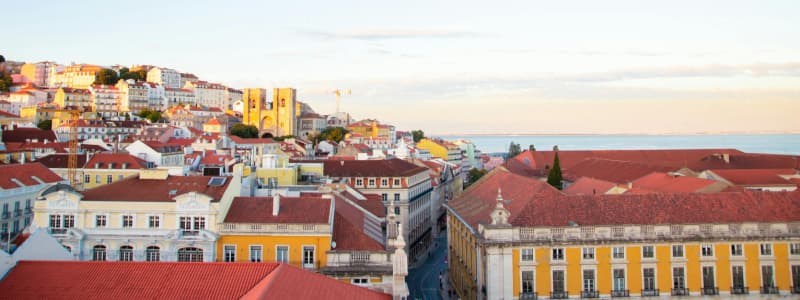| Section | Summary |
|---|---|
| Introduction to Portugal’s Textile Industry | An introduction to the historical significance, current status, and unique features of Portugal’s textile industry. |
| Advantages of Sourcing Textiles in Portugal | Exploration of the benefits of sourcing in Portugal, including quality, sustainability, certifications, and fast European delivery. |
| Key Textile Regions and Cities in Portugal | Overview of the major textile regions and cities in Portugal, highlighting their specializations and strengths. |
| Finding and Qualifying Textile Suppliers | Guide on how to find and evaluate textile suppliers in Portugal, ensuring the best match for business needs. |
| Managing the Initial Order | Tips and best practices for successfully placing and managing the first order with Portuguese textile suppliers. |
| Quality Control in Textile Sourcing | Discussion on the importance of quality control in textile sourcing and Mars Quality’s role in this process. |
| Conclusion: Future of Portuguese Textiles | Summarizing the key points of the article and the outlook for the future of textile sourcing in Portugal. |
| About Mars Quality | A brief mention of Mars Quality’s expertise and services in the field of quality control. |
Portugal’s textile industry, a vibrant and integral part of its economy, is renowned for its rich heritage, innovative spirit, and exceptional craftsmanship. With over 5,000 companies employing more than 138,000 people, this sector stands as a testament to the country’s dedication to quality and excellence in textile manufacturing.
Historically, Portugal has been a nexus of cultural and trade exchanges, influencing its textile industry’s evolution. From traditional weaving techniques passed down through generations to the adoption of modern, sustainable practices, the industry has continually adapted and thrived. This blend of tradition and innovation positions Portugal uniquely in the global textile market, attracting major fashion and shoe companies worldwide.
In this article, we provide an overview of the Portuguese textile industry and outline the key steps to ensure a successful sourcing journey.
I. Advantages of Sourcing Textiles in Portugal
Portugal’s emergence as a leading destination for textile sourcing is no mere coincidence. There is a myriad of benefits that make Portugal a standout choice for sourcing textiles.
Quality and Craftsmanship: A Tradition of Excellence
The foundation of Portugal’s textile industry is its rich history of craftsmanship. Portuguese artisans are known for their skill and attention to detail, honed over generations. This expertise is not confined to traditional methods but is continually enhanced with modern technology, ensuring products are not only aesthetically pleasing but also meet the highest standards of quality. The integration of time-honored techniques with innovative processes results in textiles that are both beautiful and durable.
Sustainability: A Forward-Thinking Approach
In today’s world, where sustainability is not just a trend but a necessity, Portugal stands out for its eco-conscious approach to textile manufacturing. The industry has seen a significant shift towards sustainable practices, including the use of eco-friendly materials, adoption of green manufacturing processes, and reduction of waste and carbon footprint. This approach aligns with the growing global demand for sustainable and ethically produced goods, making Portuguese textiles a preferred choice for environmentally conscious brands.
Certification and Compliance: A Badge of Trust
Portuguese textile manufacturers are not only committed to quality and sustainability but also adhere to rigorous international standards. Many facilities hold certifications such as ISO 9001 (Quality Management Systems), ISO 14001 (Environmental Management Systems), and SA8000 (Social Accountability). These certifications are not just plaques on the wall; they are a testament to the manufacturers’ dedication to quality, environmental stewardship, and ethical practices. Such compliance ensures that businesses sourcing from Portugal are aligned with global standards, enhancing their brand reputation and consumer trust.
Speed and Accessibility: A Logistical Advantage
Portugal offers a significant logistical advantage, particularly to European markets. The country’s strategic location, well-developed infrastructure, and efficient transportation networks facilitate quick and cost-effective shipping. This is a stark contrast to sourcing from distant countries like those in Asia, where longer lead times and higher transportation costs are common. In the fast-paced world of fashion and textiles, where time-to-market can be critical, Portugal’s proximity to key European markets is a considerable advantage.
Innovation and Adaptability: Staying Ahead of the Curve
Another key aspect of Portugal’s textile industry is its focus on innovation. The industry continually adapts to the latest trends and technological advancements. From smart textiles incorporating the latest technologies to high-performance fabrics meeting specialized needs, Portuguese manufacturers are at the forefront of textile innovation. This adaptive and forward-looking approach means that businesses sourcing textiles from Portugal have access to the latest and most advanced products.
Cultural and Economic Synergy: A Partnership Beyond Borders
Sourcing textiles from Portugal also means entering a cultural and economic partnership that extends beyond mere transactional relationships. The Portuguese textile industry is known for its collaborative approach, working closely with clients to understand their needs and tailor solutions accordingly. This synergy fosters long-term relationships and mutual growth, benefiting both the sourcing companies and the local Portuguese industry.
II. Where to Source Textiles in Portugal: Key Textile Regions and Cities

Portugal’s textile industry is not just a national affair; it is a mosaic of regional specialties, each bringing its own unique flair and expertise to the table. Understanding these key textile regions and cities is crucial for businesses looking to source high-quality textiles from Portugal. This section delves into the heart of Portugal’s textile landscape, highlighting the distinctive characteristics of each major textile hub.
Porto: The Northern Powerhouse
Porto, the northern gem of Portugal, is renowned for its rich textile heritage. This city is the epicenter of textile production in Portugal, known for its high-quality cotton fabrics, home textiles, and apparel. Porto’s textile industry is characterized by a blend of traditional craftsmanship and modern technology, making it a go-to destination for businesses seeking innovative and quality-driven textile solutions. The region’s strong infrastructure, skilled workforce, and proximity to major shipping ports add to its appeal as a premier textile sourcing location. To learn more about how quality control measures are integral to maintaining Porto’s textile standards, explore our dedicated page on Quality Control in Porto.
Lisbon: A Melting Pot of Creativity and Innovation
Lisbon, Portugal’s vibrant capital, stands out for its dynamic and creative textile scene. While it may not have the same historical depth in textiles as Porto, Lisbon has rapidly emerged as a hub for contemporary and innovative textile design. The city is home to a growing number of young, creative designers and startups focusing on sustainable and technologically advanced textiles. Lisbon’s cosmopolitan atmosphere and its focus on cutting-edge fashion and design make it an exciting place for sourcing unique and high-fashion textiles. Discover more about the role of quality control in maintaining Lisbon’s textile excellence on our Quality Control in Lisbon page.
Guimarães and Braga: The Traditional Heartlands
Guimarães and Braga, located in the Minho region, are steeped in textile tradition. These cities are known for their specialized weaving techniques and production of high-quality linen and cotton fabrics. The expertise of local artisans in these traditional heartlands of Portuguese textiles adds a unique value to the fabrics produced here, making them sought after for their authenticity and quality.
Covilhã: The Wool Capital
Covilhã, set in the Serra da Estrela mountains, is historically known as the wool capital of Portugal. This city has a long-standing tradition of woolen textile production, dating back to the 12th century. Covilhã’s textile mills are famed for their high-quality woolen fabrics, which are a testament to the region’s deep-rooted expertise in wool processing and manufacturing.
III. Finding and Qualifying Textile Suppliers in Portugal
Finding and qualifying the right textile suppliers in Portugal can be a decisive factor in the success of your business. This process requires a keen eye for quality, an understanding of the market, and a strategic approach to ensure that you partner with suppliers who can meet your specific sourcing needs. Below, we outline a step-by-step guide to help you navigate this crucial phase in sourcing textiles in Portugal.
Step 1: Research and Identify Potential Portuguese Textile Suppliers
Begin by conducting thorough research to identify potential suppliers. Utilize trade directories, industry trade shows, and online platforms to create a list of potential textile manufacturers in Portugal. Look for suppliers who specialize in the type of textiles you need, whether it’s high-quality cotton fabrics, sustainable materials, or innovative textile technologies. Don’t overlook the importance of regional specialties; for instance, Porto for cotton fabrics or Covilhã for woolen textiles.
Step 2: Evaluate Supplier Capabilities
Once you have a list of potential suppliers, evaluate their capabilities and expertise. This involves examining their production facilities, technology, workforce skill level, and quality control measures. It’s also crucial to assess their capacity to meet your volume requirements and their ability to adapt to changing demands.
Step 3: Verify Quality and Compliance Standards
Quality and compliance are non-negotiable in textile sourcing. Verify that the suppliers adhere to international quality standards and possess relevant certifications, such as ISO 9001 or SA8000. This step is vital to ensure that the textiles you source are not only of high quality but also ethically and sustainably produced.
Step 4: Assess Communication and Responsiveness
Effective communication is key in any business relationship. Assess how responsive and communicative the suppliers are. This will be crucial when it comes to managing orders, addressing concerns, and ensuring a smooth collaboration.
Step 5: Visit and Audit
If possible, visit the suppliers’ facilities in person. This allows you to get a firsthand look at their operations, meet the team, and gauge their professionalism and commitment to quality. Conducting a Supplier Verification Audit, either personally or through a third-party service like Mars Quality, can provide deeper insights into their operational efficiency and quality standards.
Step 6: Test Orders and Evaluation
Before committing to a long-term partnership, consider placing a test order. This will allow you to evaluate the supplier’s ability to meet your specifications, adhere to timelines, and maintain quality standards.
This approach to sourcing ensures that you weave a network of suppliers that are not just providers but integral contributors to your business’s success story.
IV. First Stitch to Success: Managing the Initial Order
Placing and managing the first order with a new textile supplier is a critical step in establishing a fruitful business relationship. This initial order sets the tone for future interactions and can significantly impact your supply chain’s efficiency and reliability. Managing this phase with expertise and attention to detail is essential for ensuring a smooth and successful collaboration. Here’s how to navigate this process effectively:
1. Clear Communication of Requirements
Begin with clear and detailed communication of your requirements. This includes specifications about the fabric type, quality, color, design, and any other pertinent details. Precision in this phase can prevent misunderstandings and ensure that the supplier fully comprehends your expectations.
2. Establishing a Timeline
Agree upon a realistic and clear timeline for production and delivery. It’s crucial to factor in any potential delays and have a buffer period. Setting a timeline helps in managing expectations and planning logistics, especially if the textiles are part of a larger production process.
3. Negotiating Terms and Conditions
Negotiate terms and conditions that are favorable to both parties. This includes pricing, payment terms, and conditions regarding quality discrepancies or delivery delays. A transparent and fair agreement can build trust and pave the way for a long-term partnership.
4. Quality Assurance Protocols
Implement quality assurance protocols right from the start. Discuss and agree upon the quality standards and the inspection processes.
5. Sample Approval
Before full-scale production, request a sample for approval. This step is crucial as it allows you to physically assess the quality and confirm that it meets your standards. Any feedback or adjustments can be communicated at this stage, preventing costly errors in the final order.
6. Monitoring Production
Stay engaged and monitor the production process. Regular updates from the supplier can provide insights into the progress and help in identifying any issues early in the production cycle.
7. Preparing for Logistics
Coordinate logistics in advance. Whether it’s arranging transportation or understanding customs regulations, planning ahead can prevent last-minute hurdles and ensure timely delivery.
Managing the initial order with attention to detail, clear communication, and proper quality checks is pivotal in building a strong foundation for your sourcing strategy. It not only ensures the success of the current order but also sets the stage for a reliable and effective partnership with your Portuguese textile supplier.
V. Quality Control for Sourcing Textiles in Portugal
In the textile industry, the mantra ‘quality is king’ resonates deeply. Ensuring excellence in textile sourcing is pivotal for maintaining brand reputation, customer satisfaction, and long-term success. This section delves into the crucial aspects of quality control for textile sourcing in Portugal, emphasizing the need for meticulous attention to detail and stringent quality checks throughout the sourcing process.

1. Understanding Quality Standards
Quality control begins with a clear understanding of the required quality standards. These standards vary depending on the type of textile, its intended use, and the target market. For instance, textiles for high-fashion garments will have different quality criteria compared to those used in everyday apparel. Familiarity with industry standards, such as the International Inspection Standard ANSI Z.1.4-2008, is essential.
2. Setting Clear Quality Parameters
Before initiating any order, it’s crucial to set clear quality parameters with your suppliers. This includes specifications on fabric strength, colorfastness, shrinkage, and other relevant quality indicators. Having these parameters in place guides the production process and ensures that both parties are aligned on expectations.
3. Implementing Inspection Protocols
Inspection is a key component of quality control. Implementing a multi-stage inspection process can help catch defects at various production stages. Initial production checks, during-production inspections, and pre-shipment inspections are vital to ensuring the final product meets the set standards.
4. Leveraging Third-Party Inspections
Third-party inspections add an extra layer of assurance. Companies like Mars Quality specialize in providing impartial and expert apparel inspection services. These services can be invaluable, especially when dealing with new suppliers or complex orders.
5. Addressing Non-Compliance Proactively
In cases of non-compliance or quality issues, it’s important to address them proactively. This may involve working with the supplier to identify the root cause of the problem and implementing corrective measures to prevent future occurrences.
6. Continuous Improvement and Feedback
Quality control is an ongoing process. Regular feedback and continuous improvement practices help in refining the quality control processes. This not only improves the current sourcing strategy but also strengthens the supplier relationship.
Ensuring excellence in sourcing textiles in Portugal is a multifaceted and dynamic process, requiring vigilance, expertise, and a commitment to quality at every step. With the right practices in place, businesses can not only source high-quality textiles but also build a reputation for reliability and excellence in the global market.
VI. Conclusion: Sourcing Textiles in Portugal
Portugal’s textile industry, rich in heritage and innovation, is poised for a bright future. The country’s commitment to quality, sustainability, and advanced manufacturing techniques positions it as a key player in the global textile arena. For businesses looking to source textiles, Portugal offers a unique blend of tradition and modernity, ensuring products that meet the highest standards of excellence. As the industry continues to evolve, embracing new technologies and sustainable practices, it solidifies its role as a leader in textile production. The future of sourcing textiles in Portugal looks promising, offering a world of opportunities for those seeking quality, innovation, and reliability.
About Mars Quality
Mars Quality, a leading global quality control company, specializes in ensuring the highest standards of quality in manufacturing. With a deep understanding of various industries and a commitment to excellence, Mars Quality provides indispensable support to businesses in maintaining product integrity and compliance with quality control services in Portugal. Their expertise in quality inspections, audits, and certifications makes them a valuable partner in your quality assurance journey. Choosing Mars Quality means choosing a future where quality is not just a goal, but a guarantee.

